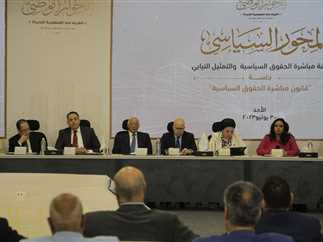The National Dialogue’s fifth session of the political track kicked off on Sunday at the Cairo International Convention Centre in Nasr City, with the participation of a wide spectrum of the society.
The political track’s committees are discussing the law on exercising political rights and the challenges of labor union work, as well as the law on municipal administration.
The dialogue’s fifth session of the economic track is due to start on Tuesday, as its committees will discuss the principles of social justice and equality among citizens, in addition to looking into the issues of public debt, budget deficit and fiscal reform.
The dialogue’s fifth session of the social track will kick off on Thursday, as the Family and Community Cohesion Committee will tackle post-divorce issues, while the Education and Scientific Research Committee will look into a draft law on establishing a supreme national council for education and training.
The National Dialogue holds its sessions on Sunday, Tuesday and Thursday, with each day is allocated to discussing one of the dialogue’s three tracks.
The dialogue was launched at the behest of President El-Sisi, during the annual Egyptian Family Iftar banquet on 26 April, who stressed that all intellectuals, syndicates and political forces were invited to participate in the dialogue.
The political track includes five subcommittees in a number of areas, namely the exercise of political rights and parliamentary representation, municipalities, human rights and public freedoms, political parties, civil society and syndicates.
The social track includes six subcommittees in areas such as education and scientific research, health, housing, social cohesion, culture and national identity, and youth.
The economic track is composed of committees responsible for discussing the issues of inflation and high prices, public debt, budget deficit and financial reform, public investments priorities and state ownership policy, private investment (both domestic and foreign), industry, agriculture and food security, social justice and, finally, tourism.
Mohamed Abdel Ghani, rapporteur of the dialogue’s political rights and parliamentary representation subcommittee, asserted that the current law of exercise of political rights is very good but there are some reservations on its enforcement.
During a session held as part of Egypt’s national dialogue under the political track on Sunday, Abdel Ghani said that exercise of the political rights is a key tool for the political process.
He said participation in the voting process during 2015 and 2020 elections reached 28 percent according to official statistics, noting that this ratio is less fewer than neighboring countries.
He said the session will address means of enforcing the law of political rights and reasons behind lower participation rates along with means of upgrading funding, participation as well as propaganda.
He said the national dialogue conference aims at increasing the participants in the political process as part of building a new republic.
Abdel Ghani said the national dialogue is not a procedural measure, but it aims at working out practical solutions.
In the same context, Representatives of various parties attending the national dialogue’s political track session asserted the necessity of providing new means to encourage citizens to participate in the electoral process.
The national dialogue’s political session kicked off Sunday to discuss the law of exercising the political rights.
MP Hossam El Kholy, representative of of Mustaqbal Watan Party, said the exercise of political rights law is very good one, but there should be a better way for its enforcement.
He said the political process aims at coming up with results that express the citizens’ views and their beliefs.
Meanwhile, MP Mahmoud Salah, representative of Homat Al Watan Party, said some reservations on the law will be addressed during the session to ensure a better voting process in the coming elections.
Parties should play more influential role in the coming phase to urge citizens especially women and youths to join the electoral process, he explained.
Also, Chairman of Al Itihad Party Reda Saqr suggested amending Article No.26 of the Political Exercise Law to allow more election donations for natural persons and parties along with applying the maximum limit for the electoral campaigns.






Discussion about this post